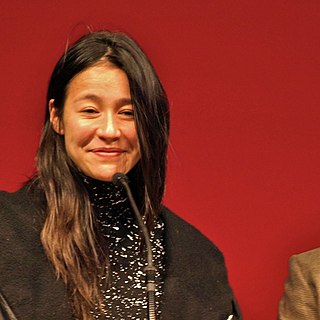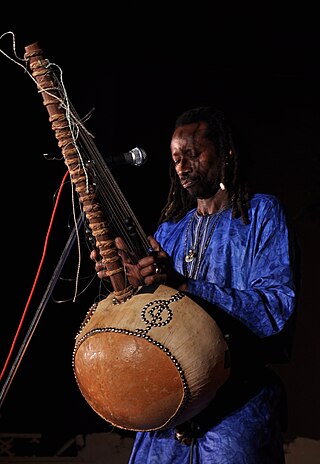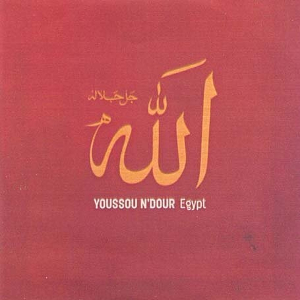
The Mouride brotherhood is a large tariqa most prominent in Senegal and The Gambia with headquarters in the city of Touba, which is a holy city for the order. Adherents are called Mourides, from the Arabic word murīd, a term used generally in Sufism to designate a disciple of a spiritual guide.The beliefs and practices of the Mourides constitute Mouridism. Mouride disciples call themselves taalibé in Wolof and must undergo a ritual of allegiance called njebbel, as it is considered highly important to have a sheikh "spiritual guide" in order to become a Mouride. The Mouride brotherhood was founded in 1883 in Senegal by Amadou Bamba. The Mouride make up around 40 percent of the total population, and their influence over everyday life can be seen throughout Senegal.

Youssou N'Dour is a Senegalese singer, songwriter, musician, composer, occasional actor, businessman, and politician. In 2004, Rolling Stone described him as, "perhaps the most famous singer alive" in Senegal and much of Africa and in 2023, the same publication ranked him at number 69 on its list of the 200 Greatest Singers of All Time. From April 2012 to September 2013, he was Senegal's Minister of Tourism.

Senegal's music is best known abroad due to the popularity of mbalax, a development of conservative music from different ethnic groups and sabar drumming popularized internationally by Youssou N'Dour.

Ahmadu Bamba Ibn Anta Saly Mbacke also known to followers as Khādimu 'al-Rasūl or "The Servant of the Messenger" and Serigne Touba or "Sheikh of Tuubaa", was a Sufi saint (Wali) and religious leader in Senegal and the founder of the large Mouride Brotherhood.

Rokia Traoré is a Malian-born singer, songwriter and guitarist.

Islam is the predominant religion in Senegal. 97 percent of the country's population is estimated to be Muslim. Islam has had a presence in Senegal since the 11th century. Sufi brotherhoods expanded with French colonization, as people turned to religious authority rather than the colonial administration. The main Sufi orders are the Tijaniyyah, the Muridiyyah or Mourides, and to a lesser extent, the pan-Islamic Qadiriyyah and the smaller Layene order. Approximately 1% are Shiites.

This is the solo discography of Peter Gabriel, an English singer-songwriter, musician and humanitarian activist who rose to fame as the lead vocalist and flautist of the progressive rock band Genesis. After leaving Genesis, Gabriel went on to a successful solo career. His 1986 album, So, is his most commercially successful, selling five million copies in America, and the album's biggest hit, "Sledgehammer", won a record nine MTV Awards at the 1987 MTV Video Music Awards. The song is the most played music video in the history of the station.

Cheikh N'Digel Lô is a Senegalese musician.
Habib Faye was a bassist, keyboardist, guitar soloist, arranger, composer and Grammy-nominated producer from Senegal. He was mostly known as the musical director for Youssou N'dour's Super Étoile de Dakar. He was one of the most talented African bassists of the last quarter-century.
Fathy Salama is a Grammy Award-winning Egyptian musician, who usually appears with his ensemble Sharkiat.

Immigrés is an album by Senegalese singer and percussionist Youssou N'Dour. AllMusic remarks that the album is "a good part of what put [N'Dour] on the international map".
The Senegal Music Awards (SENMA) is an annual celebration of the best of the music industry in Senegal. The event was instituted in 2008. Awards based on performances made in the previous year in 56 categories. The ceremonies include performances by some of the nominees, similar to the South African Music Awards and Grammy Awards.
Étoile de Dakar were a leading music group of Senegal in the late 1970s and early 1980s. Youssou N'Dour was one of the singers in the band and the band was a major part of N'Dour's rise to stardom in Senegal.

Mokobé Traoré, better known by the mononym Mokobé, is a Malian–French rapper and part of the music collective 113 alongside Rim'K and AP and within the greater French musical project and collective Mafia K-1 Fry. He also has his own solo career with two album releases Mon Afrique in 2007 and Africa Forever in 2011.
Youssou N'Dour: I Bring What I Love is a 2008 documentary film directed by filmmaker Elizabeth Chai Vasarhelyi that chronicles Senegalese icon Youssou N'Dour as he releases his Grammy Award-winning album Egypt and works to promote a more tolerant view of Islam. The film features musical superstar/activists Bono and Peter Gabriel. The documentary screened at festivals internationally including the Telluride Film Festival and Toronto International Film Festival in 2008, winning numerous audience awards as well the Special Jury Prize at the Middle East International Film Festival in 2008 and a nomination for the Pare Lorentz Award at the International Documentary Association Awards in 2009. The film premiered in New York City as the opening night of Brooklyn Academy of Music's Muslim Voices: Arts & Ideas Festival in 2009, and opened in theaters in the US and internationally to much acclaim. The film's soundtrack was released by Nonesuch Records in 2010.

Elizabeth Chai Vasarhelyi is an American documentary filmmaker. She was the director, along with her husband, Jimmy Chin, for the film Free Solo, which won the 2019 Academy Award for Best Documentary Feature. The film profiled Alex Honnold and his free solo climb of El Capitan in June 2017. Their first scripted film venture was Nyad - a biopic chronicling Diana Nyad's quest to be the first person to swim from Cuba to Florida.

The Guide (Wommat) is the seventh studio album by Senegalese singer and composer Youssou N'Dour. Recorded during the autumn of 1993 in both New York City and Dakar, the album was released on July 11, 1994, through Columbia Records. Featuring the hit single "7 Seconds", a duet with Neneh Cherry, The Guide (Wommat) is the commercially most successful album by Youssou N'Dour.

Set is an album by the Senegalese musician Youssou N'Dour, released in 1990. The album in part inspired the Senegalese youth movement Set-Setal, which sought to beautify Dakar.

Eyes Open is an album by the Senegalese musician Youssou N'Dour, released in 1992 via Spike Lee's 40 Acres and a Mule Musicworks label. A video was shot for "Africa Remembers". N'Dour supported the album with a North American tour. Eyes Open was nominated for a Grammy Award, in the "Best World Music Album" category.

Solo Cissokho was a Norwegian/Senegalese Jazz and Mbalax musician known for playing the Kora. Born into a Senegalese griot family in Ziguinchor, Casamance, Solo continued the family tradition of Kora playing at a young age.















